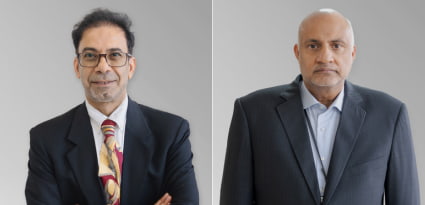
Two JHAH Scientists Ranked in Global Top 2% by Stanford University
Eminent scholars “create a culture of precision and accountability” that “raises the bar for patient safety and care,” says JHAH’s Chief Quality and Patient Safety Officer.
A molecular microbiologist and an infectious diseases expert at Johns Hopkins Aramco Healthcare (JHAH) have been ranked among the top 2% of scientists globally.
Professor Ali Rabaan, Head of the Molecular Diagnostics Laboratory at JHAH, and Professor Jaffar Al-Tawfiq, Director of Accreditation and Infection Control at JHAH, featured in the latest annual ranking by Stanford University.
Dr. Saeed Al Yami, said, adding “We are incredibly proud that two of our researchers have been recognized once again for their outstanding contributions to medical science.”
The Stanford ranking identifies the top 2% of scientists in the world based on the influence of their published research. It measures influence by analyzing research citations in Scopus, an independently curated academic database operated by Elsevier.
Prof. Rabaan has now been featured in the Stanford ranking for four consecutive years. Prof. Al-Tawfiq has featured in the ranking every year since the first edition was published in 2019.
Prof. Rabaan Said
We have a supremely strong culture of research and collaboration here at JHAH,
We always strive to ensure that innovation and excellence directly enhance patient care.
Prof. Rabaan’s research spans molecular diagnostics, public health preparedness, and infectious diseases. He integrates clinical microbiology, molecular epidemiology, and innovative diagnostic technologies to advance the early detection, monitoring, and control of emerging and re-emerging pathogens.
He is currently researching meningitis and dengue fever in South Asia and tuberculosis in BRICS+ countries. He applies molecular and genomic methods to better understand infectious disease transmission dynamics and resistance mechanisms, contributing to more effective diagnostic and prevention strategies.
Prof. Al-Tawfiq's research interests span diverse fields of infectious disease management including diagnostics, outbreak response, and antimicrobial stewardship. He has examined public health preparedness for mass gatherings such as the Hajj; the identification and containment of MERS-CoV, SARS-CoV-2, and other respiratory pathogens; and how AI platforms and big data can be deployed to predict outbreaks and monitor infection trends.
At present, Prof. Al-Tawfiq is conducting research at the intersection of mass gathering medicine and infectious disease dynamics. He aims to help strengthen infectious disease preparedness and response capacities, thereby ensuring that science effectively supports public health policy and practice. He is also engaged in modeling studies to assess the impact of vaccination strategies on emerging infectious diseases.
“JHAH has a mission to advance knowledge, address meaningful and timely medical challenges, drive societal progress, and innovate across diverse fields of science and technology,” Prof. Al-Tawfiq said. “I am proud to be part of this valuable effort.”
The latest Stanford ranking is based on Scopus citations data to August 1, 2025.
